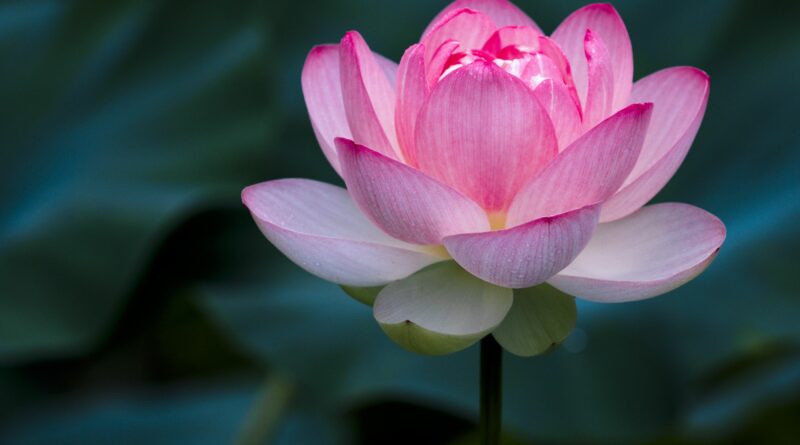Choices Now & At Death
Choices Now & at Death
All phenomena are rooted in desire. It’s one of the basic principles in the Buddha’s teachings, and it applies to your meditation right now. Make sure you desire the right things. Different desires will come up, some of them wanting to stay with the breath, some of them wanting to wander off. So, hold on to the desires that want to stay, because who knows where you’ll wander off to otherwise.
But if you stay with the breath, you can get the mind into a state of concentration. The concentration can give rise to discernment. Discernment will help you see through all the processes by which desire creates things, and you get to the point where you can go beyond. Whereas if you wander off, you’ll end up just coming back to the same old desires that you’ve been mucking around in for who knows how long. Staying on the path gives you the prospect of something new.
And you do practice with desire. We often hear that craving is the cause of suffering. That’s true. But the Buddha points out three cravings in particular: craving for sensuality, for becoming, and for non-becoming. That’s in the second noble truth. Yet in the fourth noble truth, he points out that the desire to develop what’s skillful and abandon what’s unskillful is part of the path to the end of suffering. So not all desire is bad. You want to get to know your desires really well and be able to sort them out. This is a useful skill to develop not only while you’re here meditating, but also as you go through life—and as you approach death, because the process of desiring is what will take you on to another life. You want to make sure you choose your desires well.
There was a wanderer who came to see the Buddha one time and asked him, “What is it that sustains a being from one life to the next?” And the Buddha said it’s sustained by clinging to craving, in the same way that wind sustains fire as it goes from one house to the next. The thing is, that’s not the only time when you’re sustained by your desires, sustained by your craving. As you go through your life, day by day by day, this is what defines you as a being.
Notice that when the wanderer asked that question of the Buddha, the Buddha gave him a straight answer: “Beings are sustained by craving.” If the wanderer had asked some modern Buddhists, they might have said, “Well, there really is no being there anyhow. There’s no continued identity, so there’s nothing to go from one life to the next,” which leaves people really adrift when they die and they find that they’re not ending.
We sometimes think that the Buddha simply picked up his teachings on rebirth from his culture. But the way he taught rebirth was very different from what other people taught at the time. For one thing, not everybody in his culture believed in rebirth. Some said there was no rebirth, others said there was, and the way they would try to settle the issue would be by trying to define what you are: What is this thing, this being, and can this thing be reborn or not?
Now, the Buddha took it as one of the basic principles of mundane right view that there is the next world. In other words, there is life after death. But he didn’t get involved in the common terms of the discussion. He didn’t say what it is that goes on. He said simply, “This is how it happens.” And how it happens is the same process that defines you as a being: your craving, your attachments. The only people who are not beings are arahants, because they have no attachments. That’s why they don’t get reborn.
We create our identity as beings, then we sustain it with our craving. And then, when we find we can’t stay here in this body, we grab at whatever. If you’re not prepared, you will grab at whatever. The mind is capable of all kinds of things. As the Buddha said, it’s more variegated than the animal kingdom: All the different animals that you can think of in the earth, on land, at sea, and in the sky, come from the craving of the mind. Look at the animal world and what you see is a small fraction of the many shapes and forms that the mind can take.
When you’re counseling someone who’s facing death, that’s what you want to keep in mind: that the mind is capable of grabbing on, holding on to anything. So make sure that the person holds on to good things. The Buddha’s first advice is to ask if they’re worried about anything—usually it’s with the family or with unfinished business. The Buddha’s advice is to tell the person, “Just put that aside. You’re dying now. There’s nothing you can do for the family. There’s nothing you can do about your unfinished business.” The nature of the world is that all its business is unfinished.
Tell the person who’s passing away not to expect closure, and focus instead on the state of his or her mind. The next question is, “Are you afraid of leaving your body? Are you afraid of leaving human sensuality?” If the person says, “Yes,” the Buddha’s first answer is really interesting. He says that there are levels of being where the sensuality is better. Aim your mind there. Now, this will depend on what that person’s belief systems are. When people are dying, you don’t want to impose something new on them, as long as they do believe that the mind will survive death.
What’s important is that where the mind is holding on will create a state of mind that will either be lifted up or pulled down. So have the person think of things that will lift him or her up—in other words, the goodness they’ve done, not the good times they’ve had. If you get them thinking about the good times they’ve had, they might get depressed over the fact that those good times are over. Have them think instead of the times they’ve been generous, they’ve been virtuous, when they’ve shown their goodwill to others: Have them focus their mind there. In other words, give the mind something good to hold on to.
Then the Buddha goes on to say that if the person is capable, you might say, “Even the best thing you can hold on to would be a self-identity. And self-identities are going to change and end. It would be better if you could let go of the need for self-identity.” In other words, stop defining yourself as a being. Let go, totally. But for a lot of people, that’s not in the cards. So instead, you have them focus on the good they’ve done. That way, when different possibilities open up to them as they find that they can’t stay in the body, they’ll have the confidence that they have some good to them. There’s no reason why they have to go down.
The ajaans in Thailand talk about two kinds of visions that appear to a person passing away. The first kind consists of visions of their past actions. The other is visions of where they can go. If you’ve been focusing on some past bad actions, then if a vision of a bad place to go comes up, you’re likely to fall for it, because that’s one of the things we fear as we approach death: that maybe there will be some punishment lying in wait for the bad things we’ve done in life. This is one of the reasons why people who’ve done bad things often like to comfort themselves with the idea that, well, maybe if everything was pre-determined, they didn’t have any choice, they’re not responsible, and therefore they won’t get punished. But that’s not how things work.
The important thing to keep in mind is that there are only a very few things that would absolutely ensure that you would have to go down: killing your parents, killing an arahant. As long as you haven’t done any of those things, then you’ve got the possibility of going up. As the Buddha said, that’s part of the complexity of kamma. There are some times when you do something bad in this lifetime but you don’t suffer in the next, and vice versa: You do good things in this lifetime and yet you suffer in the next, because the kamma you’re dealing with is not just the kamma in this lifetime, but also your kamma from the past. Where you go also has to do with whether you change your mind, up or down, in the course of your life.
This is why so much emphasis is placed on the state of the mind as you’re dying. That’s asking for an awful lot, because as you’re dying, you’re dealing with the fact that the body is not cooperating anymore. It’s no longer doing the things it used to do for you.
This is another reason why we meditate: to develop the strength of mind that doesn’t have to depend on the strength of the functioning of the body. So work on your mind here, because it does influence how you’re living, who you are in this lifetime, and how you go as you go to the next. And it is possible to change the mind. Past kamma is not iron-clad. It creates tendencies. But we can develop skills in the present moment to handle even bad tendencies and not suffer from them.
This principle of having choice in the present moment is really central to the practice. You do have the choice to develop the mind or to do something else. The Buddha took this so seriously that even though he wasn’t the sort of person who went around picking fights, he would go and search out teachers whom he had heard were teaching that you don’t have choices, or if you do have choices, it doesn’t matter because your actions don’t have any results. Those kinds of teachings, the Buddha said, are really detrimental. The people who teach them do a lot of harm, which is why he felt it was important to seek those people out and see if he could change their minds, or at least let other people know that that kind of teaching was dangerous. As he said, it leaves you unprotected and bewildered. You don’t want to be unprotected and bewildered as you’re going through life, and especially as you’re facing death.
Have confidence that you can change the mind. You have that choice. And the mind does have possibilities, many of which are more than you can imagine. So, train the mind in the direction where it will go for the best possibilities. Keep in mind the principle of choice and have the confidence that, yes, you can learn how to make better and better choices.
If that weren’t possible, the Buddha wouldn’t have taught. The fact that he did teach after gaining awakening is a sign that he wanted us to take this as a working hypothesis: that we do have choices. Because it’s not until you gain your first taste of awakening that you really know for sure that, yes, you have choices and that they can become so skillful that they can lead you to the end of suffering. Only at stream-entry will you know for sure. Up to that point, it’s a matter of faith—or if you don’t like the word faith, use the word conviction. It’s a working hypothesis. Act on it and, the Buddha says, you’ll benefit. Everybody who’s reached awakening also says you’ll benefit. They’re the kind of people you want to believe.



